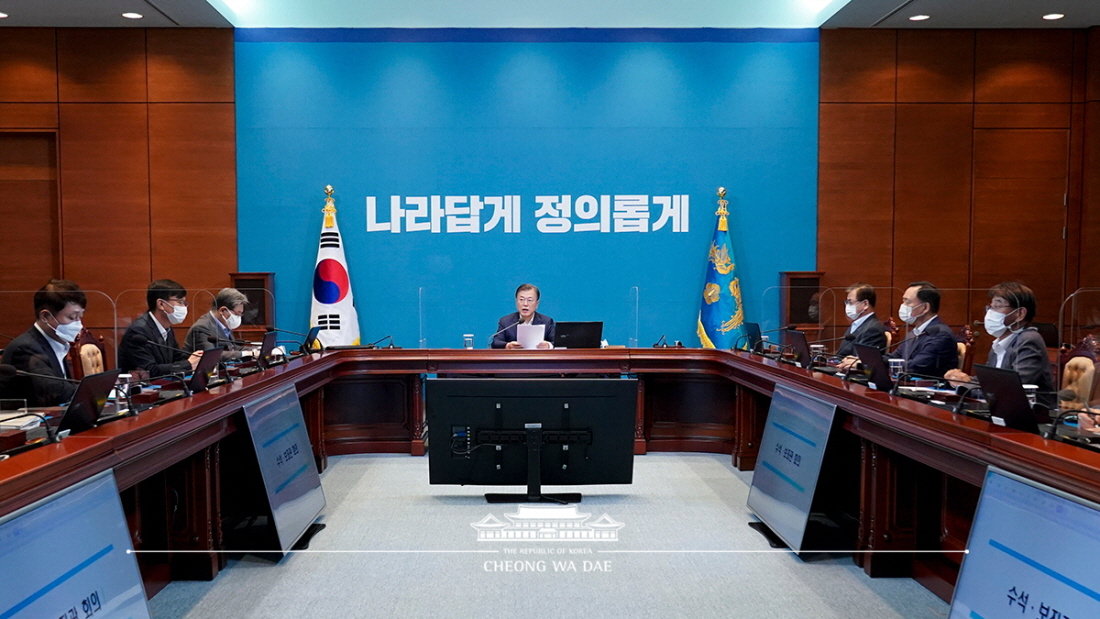이 웹사이트는 제19대 대통령 임기 종료에 따라 대통령기록관이 「대통령기록물 관리에 관한 법률」에 의해 이관받아 서비스하는 대통령기록물입니다. 자료의 열람만 가능하며 수정 · 추가 · 삭제는 불가능합니다.
다만, 「개인정보보호법」에 의하여 개인의 정보를 보호받기 원하시는 분은 관련 내용(요청자, 요청내용, 연락처, 글위치)을 대통령 웹기록물 담당자(044-211-2253)에게 요청해 주시면 신속히 검토하여 조치해 드리겠습니다. 감사합니다.
SPEECHES & REMARKS
BRIEFINGS
Opening Remarks by President Moon Jae-in at Meeting with His Senior Secretaries

This past Chuseok break featured quite a different picture from that of the previous years. While it is normally a period of mass exodus for homecomings, many people refrained from visiting their hometowns or taking trips. Average daily traffic during the holiday reportedly dropped 19.3 percent from last year. Even though this Chuseok fell within a specially designated period for epidemic prevention and control, our people cooperated well.
Despite the long Chuesok break, screening stations operated on a normal schedule. Medical professionals gave up their days off and guarded the frontlines of the battle against COVID-19. Fortunately, the number of new confirmed COVID-19 cases in the country has remained in the double digits throughout the extended holiday, showing a declining trend.
The police also did everything possible to prevent any glitch in epidemic control. In particular, concerns were mounting over illegal rallies on National Foundation Day, but the police made thorough preparations and put airtight controls in place, so they would not trigger a resurgence of COVID-19. Our citizens cooperated and put up with considerable traffic inconveniences.
It is also fortunate that the number of accidents decreased substantially over the long Chuseok break. Notably, the number of traffic and maritime accidents sharply dropped, keeping human casualties to a minimum. This is the result of traffic being dispersed, due to the reduced number of people on the move, coupled with preparations by relevant ministries and agencies as well as the public’s safety awareness.
There was also good economic news during the holiday. Our country’s economic growth rate ranked first in the second quarter among OECD member states. Our exports rose by 7.7 percent in September year on year – the highest monthly figure this year – shifting to an upswing after a seven-month decline caused by COVID-19. Our country’s epidemic prevention and control is regarded as an example for the world because we are also faring relatively well on the economic front. All of these positive results are attributable to our people’s active cooperation. I extend my profound appreciation to them once again.
It is time for everyone to go back to their daily routines. The number of people on the move during the recent holiday reportedly decreased, but it still totaled 31 million. The specially designated epidemic prevention and control period will be extended until the coming weekend as the spread of COVID-19 must also be minimized during this period since the Chuseok break could trigger another spike. It might be difficult and inconvenient, but we must still pull together to bring about a definite trend toward leveling off. Only then will we be able to escape this critical two-month COVID-19 resurgence phase and gradually enter the stabilization stage.
The outcome of such efforts will also determine the pace of recovery for people’s livelihoods and the economy. Korea’s economy is said to be performing relatively well thanks to the achievements of our COVID-19 responses, but it is really heartbreaking to think of those who have been long suffering from economic difficulties due to COVID-19. The Government has put aggressive economic countermeasures into force, including the fourth supplementary budget, but these measures are not fundamental solutions. The Government will exert more effort to produce tangible results with epidemic prevention and control and do all it can to revive people’s livelihoods and the economy as soon as possible.
More good news was released during the Chuseok break: Korea placed 8th among the 63 countries in the IMD World Digital Competitiveness Ranking 2020. Korea’s rank rose two notches from last year and by 11 notches from 2017. Among the nations with populations of more than 20 million, Korea is in second place behind the United States. On top of the efforts made by previous administrations, our Administration’s ever-increasing emphasis on digital innovation is starting to produce results.
Meanwhile, our digital content industry is also growing remarkably. Korea’s content capabilities are already at a world-class level. Last year, the country’s content exports surpassed US$10 billion for the first time in history. The country also recorded its first-ever surplus in trade linked to culture and arts copyrights in the first half of this year. If we combine our excellent cultural capabilities and our top-notch digital competitiveness, the digital content industry will help Korea emerge as a new cultural powerhouse.
The digital powerhouse status being pursued by our Government and the era of a content renaissance are by no means in the distant future. The Government will quicken the pace even more. As a key pillar of the Korean New Deal, our new national development strategy, we will accelerate the Digital New Deal initiative so that our digital competitiveness and content capabilities can take the lead globally. Through the digital economy, we will achieve a great economic transformation from being a fast-follower to a pacesetter. I hope that the people will be confident about this as well.



